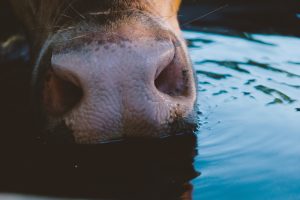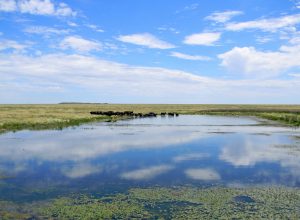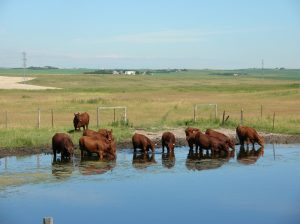It’s always good to be cautious when signing agreements — some would argue, especially pertinent when working out an agreement with agencies within the federal government.
After being notified that the U.S. Bureau of Land Management and the U.S. Forest Service have been asking ranchers who graze on federal lands to sign voluntary agreements, the Idaho Farm Bureau Federation stepped in with a cautionary warning.
Along with signing the voluntary agreements, Idaho’s Farm Bureau says that the BLM and USFS have been implying that ranchers who do not sign the agreements will not have future access to water on their allotments.
Russ Hendricks, director of governmental affairs for IFBF, said that is not true and access to that water is protected by state and federal law.
“They’re not actually coming out and saying this, but they are implying very heavily that if you don’t sign this agreement with us, that water could be no longer available, and you won’t have any water to water your stock with,” he said. “That is simply not true.”
IFBF officials advise ranchers with grazing permits on federal land to think twice before signing one of these agreements.
Doing so, Hendricks said, would allow the BLM or Forest Service to maintain the water rights in the federal agency’s name and prohibit the rancher from filing for in-stream stock watering rights on the allotment in the future.

The Joyce Livestock decision allows permittees water rights
In a landmark water rights ruling known as the Joyce Livestock decision, the Idaho Supreme Court in 2007 ruled in favor of two Owyhee County ranchers in their battle with the BLM over who owns in-stream stock watering rights on federally administered land.
During the state’s Snake River Basin Adjudication process, southern Idaho ranchers and the BLM filed thousands of overlapping claims to in-stream stock watering rights on federal land.
All but two ranchers, Paul Nettleton, and Tim Lowry, backed off or negotiated with the BLM when they realized fighting the federal agency in court would cost a lot of money.
Agreeing with Nettleton and Lowry, the state’s supreme court ruled that BLM didn’t own the rights because it doesn’t own cows and couldn’t put the water to beneficial use.
The court said BLM’s argument reflected a severe misunderstanding of Idaho water law.
During the SRBA process, the water adjudication court conveyed 17,000 stock watering rights to the BLM before the Joyce ruling. However, since BLM cannot put the water to beneficial use, they are now in jeopardy of forfeiting these rights through non-use under decades-old Idaho law.
The Idaho Legislature passed a bill several years ago that codifies the Idaho Supreme Court’s 2007 decision into state law, which paves the way for thousands of ranchers in Idaho to file competing claims for those in-stream stock watering rights on BLM and Forest Service land.

Why are the BLM and Forest Service asking for permittees to sign?
To keep those water rights, the BLM and Forest Service are now encouraging permittees to sign agreements stating that they are acting as federal government agents and that their livestock is putting the water to beneficial use for the agency.
In an email response to IFBF questions on this issue, BLM officials said the agency is “encouraging permittees to sign the voluntary (agreements) to help ensure that they can continue to utilize the state-based stock water rights obtained by the BLM for the term of their permit and any subsequent renewals. A signed agreement helps protect the stock water rights in the permittees’ allotments from a possible future forfeiture proceeding.”
BLM said the agreements “ensure regulatory certainty for permittees and ensure that all stock water rights in an allotment remain available for the permittee.”
Hendricks said there is no other way the BLM or Forest Service can have a stock water right unless they have an agent — in this case, the rancher — who is putting the water to beneficial use for them.
“The Joyce Livestock decision is pretty clear,” he said. “The only way that they can have a valid water right under Idaho law is to get somebody who does not fully understand the situation to sign an agency agreement that says they’re putting the water to beneficial use for and on behalf of the agency.”
If a grazing allotment permittee does not sign the agreement, Hendricks said, the BLM or Forest Service could potentially forfeit a water right that was decreed to them during the SRBA because they are not putting the water to beneficial use.
Meanwhile, he added that the rancher would be free to file for that water right with the Idaho Department of Water Resources.

Rancher’s access to water is not in jeopardy in this case
The federal agencies’ assertion that a rancher’s access to that water could be in jeopardy is not true, Hendricks said.
“The water cannot be ‘lost’ or taken away from the allotment by anyone else,” he said. “You are able to legally file for the stock water rights on your allotment in your name, and if the government forfeits their current rights, you will be the sole holder of water rights on your allotment.”
“Under the Joyce Livestock decision by the Idaho Supreme Court, if the permittees own and manage the livestock, they should own the water rights,” said Paul Arrington, executive director of the Idaho Water Users Association. “They are the ones putting the water to beneficial use.”
He said that permittees’ deferred claims are valid water rights recognized under Idaho water law and therefore, even if BLM or Forest Service’s adjudicated water rights are forfeited, the permittees still have a valid, underlying water right that they are entitled to file upon.
“A water right is based on beneficial use — you have to actually use the water,” Arrington said. “The water cannot be claimed by anyone who has not actually used that water.”
Hendricks said Idaho Code 42-113 requires the Idaho Department of Water Resources director and district courts to “recognize and protect water rights for in-stream (as well as out-of-stream) livestock use.”
“Therefore, even if the BLM or the Forest Service is legally required to forfeit the stock water rights they hold, under Idaho law, the water reverts back to the state and is protected for stock watering,” he said. “Nobody else can file on that water nor prohibit the ability to water stock on your allotment in the future.”
Hendricks also pointed out that the same Idaho Code states that an individual’s stock water rights on a federal allotment are an appurtenance to the permittee’s base property. Therefore, when a ranch is sold to someone else, the water rights transfer with the base property for the new owner to use on the associated federal grazing allotment.
“This makes a federal grazing permit more valuable, and thus the ranch more valuable, by having secure water rights to go along with the permit,” he said.
»Related: Coalition sends letter to EPA on WOTUS amid lack of public hearing


